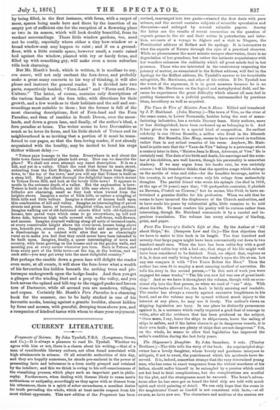CURRENT LITERATURE.
Fragments of Science. By John Tyndall, F.R.S. (Longmans, Green, and Co.)—It is always a pleasure to read Dr. Tyndall. Whether we agree with him or not, there is a charm about his writing.—that of a man of considerable literary culture, not often found associated with high attainments in science. Of all scientific authorities of this day, and they are happily numerous, he stands pre-eminent in the power of presenting facts and inferences in a form easily grasped and retained by the intellect; and this we think is owing to his self-consciousness of the visualising process, which plays such an important part in philo- sophy. Furthermore, when dealing with themes likely to rouse men's enthusiasm or antipathy, accordingly as they agree with or dissent from his utterances, there is a spirit of sober earnestness, a manifest desire for truth pervading the whole, which at least merits respect from his most violent opponents. This new edition of the Fragments has been revised, rearranged into two parts—wherecf the first deals with pure science, and the second contains subjects of scientific speculation and discussion—and enlarged by several valuable papers. Among the latter are the results of recent researches on the question of organic germs in the air and their action in putrefaction and infec- tion, accounts of a voyage to Algiers and a visit to Niagara, the Presidential address at Belfast and its apology. It is instructive to view the aspects of Nature through the eyes of a practised observer. While no phenomenon the most minute escapes observation, there is no degradation of her grandeur, but rather the intimate acquaintance with her wonders enhances the sublimity which all great minds feel in her presence. Those who are interested in the controversy respecting the potency of matter, as enunciated in the Belfast address, will find in the Apology for the Belfast address, Dr. Tyndall's answer to his formidable antagonist, Mr. Martineau, and oilier of his critics. If Dr. Tyndall has
the worst of the argument, it is in great measure because he is no match for Mr. Martineau on the logical and metaphysical field, and be- cause he experiences the great difficulty which almost all men feel in putting themselves in a judicial position, untrammelled by previous ideas, hereditary as well as acquired.


































 Previous page
Previous page